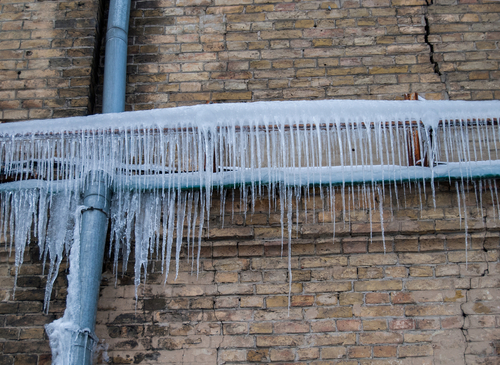This great article which follows pertaining to How To Avoid Freezing Pipes is particularly interesting. You should see for yourself.

Winter can damage your pipes, especially by freezing pipes. Here's how to avoid it from happening and what to do if it does.
Introduction
As temperatures drop, the threat of frozen pipes boosts, potentially bring about pricey repair services and water damage. Recognizing just how to stop icy pipes is important for property owners in cold environments.
Prevention Tips
Shielding prone pipelines
Wrap pipelines in insulation sleeves or utilize heat tape to shield them from freezing temperatures. Concentrate on pipes in unheated or outside locations of the home.
Heating methods
Maintain interior areas adequately heated up, specifically locations with plumbing. Open cupboard doors to enable cozy air to flow around pipes under sinks.
How to identify icy pipelines
Look for reduced water circulation from faucets, unusual smells or noises from pipelines, and visible frost on exposed pipes.
Long-Term Solutions
Architectural modifications
Think about rerouting pipes far from exterior walls or unheated areas. Add additional insulation to attics, basements, and crawl spaces.
Updating insulation
Invest in high-grade insulation for pipelines, attic rooms, and walls. Correct insulation assists maintain regular temperature levels and decreases the risk of icy pipes.
Shielding Outdoor Pipes
Garden tubes and outdoor taps
Disconnect and drain pipes yard hose pipes prior to winter months. Set up frost-proof faucets or cover outdoor faucets with protected caps.
Recognizing Frozen Pipes
What creates pipelines to freeze?
Pipes freeze when subjected to temperature levels listed below 32 ° F (0 ° C) for extended periods. As water inside the pipes freezes, it expands, putting pressure on the pipe wall surfaces and possibly triggering them to rupture.
Dangers and problems
Icy pipelines can lead to water disruptions, building damages, and pricey fixings. Ruptured pipes can flooding homes and create substantial structural damage.
Indicators of Frozen Water Lines
Identifying icy pipes early can prevent them from rupturing.
What to Do If Your Pipes Freeze
Immediate activities to take
If you think icy pipes, maintain faucets open up to alleviate stress as the ice melts. Make use of a hairdryer or towels soaked in warm water to thaw pipelines gradually.
Conclusion
Stopping frozen pipelines requires positive procedures and quick responses. By understanding the reasons, indications, and preventive measures, home owners can safeguard their plumbing throughout winter.
Helpful Tips to Prevent Frozen Pipes this Winter
UNDERSTANDING THE BASICS: WHY PIPES FREEZE AND WHY IT’S A PROBLEM
Water freezing inside pipes is common during the winter months, but understanding why pipes freeze, and the potential problems it can cause is crucial in preventing such incidents. This section will delve into the basics of why pipes freeze and the associated problems that may arise.
THE SCIENCE BEHIND FROZEN PIPES
When water reaches freezing temperatures, it undergoes a physical transformation and solidifies into ice. This expansion of water as it freezes is the primary reason pipes can burst. As the water inside the pipe freezes, it expands, creating immense pressure on the walls. If the pressure becomes too great, the pipe can crack or rupture, leading to leaks and water damage.
FACTORS THAT CONTRIBUTE TO PIPE FREEZING
Low Temperatures: Extremely cold weather, especially below freezing, increases the risk of pipes freezing. Uninsulated or Poorly Insulated Pipes: Pipes located in unheated areas, such as basements, crawl spaces, or attics, are more prone to freezing. Insufficient insulation or lack of insulation altogether exacerbates the problem. Exterior Wall Exposure: Pipes running along exterior walls are susceptible to freezing as they encounter colder temperatures outside. Lack of Heating or Temperature Regulation: Inadequate heating or inconsistent temperature control in your home can contribute to frozen pipes. PROBLEMS CAUSED BY FROZEN PIPES
- Pipe Bursting: As mentioned earlier, the expansion of water as it freezes can cause pipes to burst, resulting in significant water damage.
- Water Damage: When pipes burst, it can lead to flooding and water damage to your property, including walls, ceilings, flooring, and personal belongings.
- Structural Damage: Prolonged exposure to water from burst pipes can compromise the structural integrity of your home, leading to costly repairs.
- Mold and Mildew Growth: Excess moisture from water damage can create a favorable environment for mold and mildew growth, posing health risks to occupants.
- Disrupted Water Supply: Frozen pipes can also result in a complete or partial loss of water supply until the issue is resolved.
WHY CERTAIN PIPES ARE MORE PRONE TO FREEZING
- Location: Pipes located in unheated or poorly insulated areas, such as basements, crawl spaces, attics, or exterior walls, are at higher risk of freezing.
- Exterior Pipes: Outdoor pipes, such as those used for irrigation or exposed plumbing, are particularly vulnerable to freezing as they are directly exposed to the elements.
- Supply Lines: Pipes that carry water from the main water supply into your home, including the main water line, are critical to protect as freezing in these lines can affect your entire plumbing system.
- Underground Pipes: Pipes buried underground, such as those connected to sprinkler systems or outdoor faucets, can be susceptible to freezing if not properly insulated.
https://busybusy.com/blog/helpful-tips-to-prevent-frozen-pipes-this-winter/
.jpg)
We had been made aware of that write-up on Helpful Tips to Prevent Frozen Pipes this Winter from a pal on our other web page. Don't hesitate to set aside a second to share this post if you enjoyed reading it. Thanks so much for going through it.
Click Here